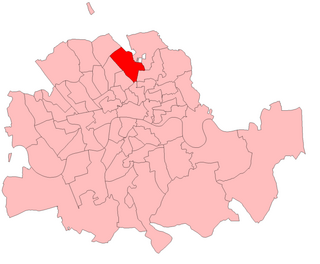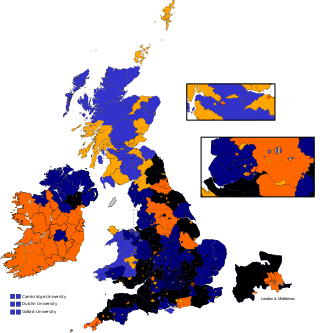
Edinburgh Central was a burgh constituency of the House of Commons of the Parliament of the United Kingdom from 1885 to 2005. It elected one Member of Parliament (MP) by the first past the post system of election.
Liverpool Exchange was a borough constituency within the city of Liverpool in England, centred on Liverpool Exchange railway station. It returned one Member of Parliament (MP) to the House of Commons of the Parliament of the United Kingdom, elected by the first past the post system.
Luton was a constituency including the town of Luton in Bedfordshire. It returned one Member of Parliament (MP) to the House of Commons of the UK Parliament from 1885 to 1974, elected by the first past the post system.

Ilkeston is a former United Kingdom Parliamentary constituency. It was a constituency of the House of Commons of the Parliament of the United Kingdom. It was represented by one Member of Parliament. In 1983 it was abolished, together with South East Derbyshire, when the Derbyshire county constituencies were redrawn - the constituencies of Amber Valley and Erewash were created and the constituency of South Derbyshire was re-created.
Birmingham East was a parliamentary constituency in the city of Birmingham, England. It returned one Member of Parliament (MP) to the House of Commons of the Parliament of the United Kingdom, elected by the first-past-the-post voting system.
Birmingham North was a parliamentary constituency in the city of Birmingham, England. It returned one Member of Parliament (MP) to the House of Commons of the Parliament of the United Kingdom, elected by the first-past-the-post voting system.

Rossendale was a parliamentary constituency in the Lancashire, England. Created in 1885, it elected one Member of Parliament (MP) to the House of Commons of the Parliament of the United Kingdom, elected by the first-past-the-post voting system. When created it comprised the districts of Rawtenstall, Bacup, and Haslingden; Ramsbottom district was added to the constituency in 1950.

Islington East was a constituency which returned one Member of Parliament (MP) to the House of Commons of the Parliament of the United Kingdom from 1885, until it was abolished for the February 1974 general election.

Darwen was a county constituency in Lancashire, centred on the town of Darwen. It returned one Member of Parliament to the House of Commons of the Parliament of the United Kingdom from 1885 until it was abolished for the 1983 general election.

Clapham was a borough constituency in South London which returned one Member of Parliament (MP) to the House of Commons of the UK Parliament. It was created in time for the 1885 general election then altered in periodic national boundary reviews, principally in 1918, and abolished before the February 1974 general election. In its early years the seat was officially named Battersea and Clapham Parliamentary Borough: No. 2—The Clapham Division.

Salford West was a parliamentary constituency in the City of Salford in Greater Manchester from 1885 until 1983. It returned one Member of Parliament (MP) to the House of Commons of the Parliament of the United Kingdom.
Blackpool was a parliamentary constituency centred on the town of Blackpool in Lancashire. It returned one Member of Parliament (MP) to the House of Commons of the Parliament of the United Kingdom.
Birmingham Handsworth was a parliamentary constituency centred on the Handsworth district of Birmingham. It returned one Member of Parliament (MP) to the House of Commons of the Parliament of the United Kingdom. It was abolished in 1983.
Thornbury was a county constituency centred on the town of Thornbury in Gloucestershire. It returned one Member of Parliament (MP) to the House of Commons of the Parliament of the United Kingdom, elected by the first past the post voting system.
Birmingham Bordesley was a borough constituency in the city of Birmingham, which returned one Member of Parliament (MP) to the House of Commons of the Parliament of the United Kingdom. Elections were held using the first-past-the-post voting system.
Egremont was a parliamentary constituency centred on the town of Egremont in Cumberland. It returned one Member of Parliament (MP) to the House of Commons of the Parliament of the United Kingdom, elected by the first past the post system.

East Cumberland is a former county constituency in the House of Commons of the Parliament of the United Kingdom. It elected two Members of Parliament (MPs) by the bloc vote system of election.

West Cumberland was a county constituency in the House of Commons of the Parliament of the United Kingdom. It elected two Members of Parliament (MPs) by the bloc vote system of election.
Osgoldcross was a parliamentary constituency in the Osgoldcross Rural District of West Yorkshire. It returned one Member of Parliament (MP) to the House of Commons of the Parliament of the United Kingdom, elected by the first past the post system.
The 1911 Westbury by-election was a Parliamentary by-election held on 22 February 1911. The constituency returned one Member of Parliament (MP) to the House of Commons of the Parliament of the United Kingdom, elected by the first past the post voting system.









